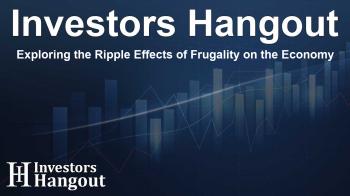Exploring the Ripple Effects of Frugality on the Economy

A Deeper Look into Frugality and Economic Health
Recently, an insightful discussion surfaced in the Reddit community about frugal living and its unforeseen consequences on the economy. While many advocate for a simpler, more sustainable lifestyle—focusing on cooking at home, reusing clothes, and making better use of library resources—there's a growing awareness of the potential drawbacks of widespread adoption of these habits.
The Appeal of Simple Living
The beauty of living simply lies in its benefits. People often express a sense of fulfillment when they prepare meals at home instead of dining out or when they choose to repurpose what they already own. The philosophy promotes not just personal savings, but also environmental responsibility. These choices seem to resonate well with the values of many consumers today.
Understanding Economic Growth Dynamics
However, the dialogue also highlights a paradox: what is beneficial on a personal level may not translate well into macroeconomic prosperity. The mindset of many individuals appears to be shifting toward a minimalist approach, being cautious about spending while simultaneously advocating for ecological sustainability. Yet, this way of life can be at odds with our economic structure.
Frugality vs. Economic Expansion
A commentator in the Reddit thread pointed out a crucial concern—the principles of capitalism are often viewed as opposing the ideals of environmentalism. Economic growth thrives on spending; therefore, lower consumer expenditure might trigger adverse effects on the economy as a whole.
The Complexity of Consumer Spending
Many businesses and the economy itself depend heavily on the circulation of money. The more money spent, the faster it moves through the economy, contributing to the overall growth. When individuals begin to economize and limit consumption, the flow of money could slow down, creating a ripple effect throughout various industries and sectors.
The Impact of Economic Myths
It’s interesting to note how the prevailing view often equates economic health with consumer spending. Some voices in the discussion articulated this irony—what people perceive as prudent financial management can be categorized as negative for GDP performance by economists. Nevertheless, numerous households operate in survival mode, cultivating frugal habits that are not merely preferences but necessities.
Shifting Perspectives on Economic Success
A significant part of this conversation revolves around reimagining economic success. Suggestions included exploring economic models that don't hinge entirely on consumer spending and instead focus on quality of life. Countries with alternative growth patterns have shown that it’s possible to maintain a satisfying lifestyle without constant economic expansion.
Alternative Economic Models
Some experts believe in the feasibility of redefining success beyond GDP. Conversations surrounding sustainable manufacturing, local economies, and the importance of investing in quality rather than quantity have emerged. These initiatives stress the responsibility consumers have to promote ethical practices with their purchasing decisions.
Changing Consumer Narratives
As consumers become increasingly aware of their potential impact through conscious spending, many advocate for overhaul in traditional measurement metrics like GDP. This dialogue emphasizes the need for values that promote sustainable growth, a richer quality of life, and a community-based economy.
Confronting the Tension
The persistent question remains: Can an economy that relies on constant consumption genuinely support a cultural shift toward valuing enough? Consumers are challenged to find balance in their wants versus societal needs. In considering this balance, many are beginning to realize that while frugality may seem counterproductive to economic growth, it could lead to a more sustainable model if approached thoughtfully.
The Call for Change
As noted by various participants in the Reddit thread, embracing frugal living doesn’t necessarily equate to economic decline. There is potential for more sustainable economic practices, enabling citizens to live comfortably while minimizing the ecological footprint. As discussions around alternative models continue, it's clear that every choice, however small, may pave the way for a more balanced future.
Frequently Asked Questions
Why is frugal living considered beneficial?
Frugal living promotes financial savings and environmental sustainability, leading to a more fulfilling lifestyle.
How does consumer spending affect economic growth?
Consumer spending is a primary driver of economic growth; decreased spending can slow down economic activity.
Can alternative economic models exist?
Yes, models focusing on community well-being and sustainability challenge traditional narratives of growth centered on consumption.
What are some sustainable purchasing practices?
Investing in quality products from ethical manufacturers ensures support for sustainable economies and practices.
How does the discussion of minimalism intersect with capitalism?
Minimalism often clashes with capitalist principles that rely on continuous growth and consumption for economic viability.
About The Author
Contact Henry Turner privately here. Or send an email with ATTN: Henry Turner as the subject to contact@investorshangout.com.
About Investors Hangout
Investors Hangout is a leading online stock forum for financial discussion and learning, offering a wide range of free tools and resources. It draws in traders of all levels, who exchange market knowledge, investigate trading tactics, and keep an eye on industry developments in real time. Featuring financial articles, stock message boards, quotes, charts, company profiles, and live news updates. Through cooperative learning and a wealth of informational resources, it helps users from novices creating their first portfolios to experts honing their techniques. Join Investors Hangout today: https://investorshangout.com/
The content of this article is based on factual, publicly available information and does not represent legal, financial, or investment advice. Investors Hangout does not offer financial advice, and the author is not a licensed financial advisor. Consult a qualified advisor before making any financial or investment decisions based on this article. This article should not be considered advice to purchase, sell, or hold any securities or other investments. If any of the material provided here is inaccurate, please contact us for corrections.

